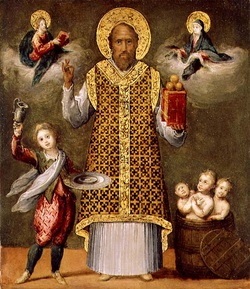
When he had given himself entirely to God he set forth for Palestine, that he might see the Holy Places, and worship therein. During this pilgrimage he embarked once on board a ship when the sky was clear and the sea calm, but he foretold a great storm, which afterwards arose and raged until the sailors were afraid; and then the saint by prayer stilled the tempest. After he had returned home, and his holy life was known to all men, God bade him to to Myra, which is the chief city of Lycia, at a time when the Bishop had just died and the Bishops of the Province were called together to choose a successor. While they deliberated, they received a warning from heaven to choose that Nicholas who should first come into the church in the morning. In obedience to that warning, Nicholas was seized at the door of the church, and with universal consent consecrated Archbishop. In his great office he was an unceasing model of purity, as he had always been, of gravity, of regularity in prayer, of watching, of abstinence, of charity, of hospitality, of meekness in exhortation, and of sternness in rebuke.
He was the comforter of widows and orphans by money, by advice, and by labour. He was the deliverer of the oppressed, so mightily, that it is related that the Emperor Constantine once unjustly condemned three Tribunes to death, and these unhappy men called upon Nicholas, though living and absent, to save them, who yet appeared in a vision to the Emperor, and forced him by threats to set them free. When the Emperors Diocletian and Maximian published their edict against Christianity, Nicholas did not cease to preach the truth at Myra, wherefore he was seized by the soldiers of the Emperors, carried away from his See, and thrown into prison, where he remained until the accession of Constantine. This Prince set him free, and he returned to Myra. He betook himself to the first Council of Nicea, where he was one of the 318 Bishops who condemned the heresy of Arius. He returned thence to his Bishoprick, and, not long after, became aware of the approach of death. When his last moment was come, he lifted up his eyes to heaven, and, when he saw the Angels coming to meet him, he began to recite the thirtieth Psalm, In thee, O Lord, do I put my trust, and when he had said, Into thy hands I commend my spirit, he passed to the heavenly Fatherland. His body was finally removed to Bari in Apulia, where it is kept with great fame and honour.




